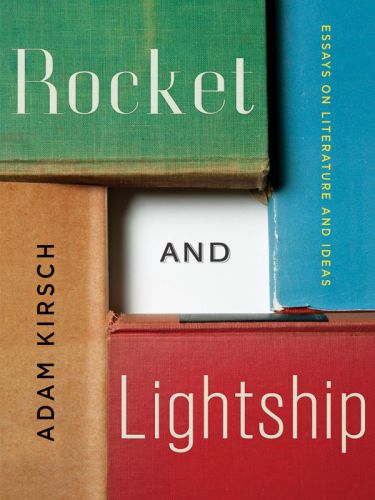
Rocket and Lightship
Essays on Literature and Ideas
- اطلاعات
- نقد و بررسی
- دیدگاه کاربران
نقد و بررسی

October 15, 2014
A critic asks why literature matters. In this collection of 19 essays, New Republic senior editor Kirsch (Why Trilling Matters, 2011, etc.) considers the cultural work of literature, complicating Matthew Arnold's comment that poetry is "at bottom a criticism of life." Focusing on writers as diverse as Italian poet Giacomo Leopardi, German philosopher Peter Sloterdijk, and critics Walter Benjamin and Susan Sontag, Kirsch maintains that all literature expresses "the writer's experience of being in the world, of his aspirations and expectations and anxieties." These essays reflect on both the writer's and reader's contexts, illuminating their complexities. In an analysis of Sontag's work, for example, Kirsch argues that Cynthia Ozick, who saw in Sontag "the stylish barbarism of the sixties," and Camille Paglia, who castigated Sontag as a self-absorbed elitist, both were right if one considers the intellectual transformations evident in Sontag's essays and journals. Kirsch is a contributing editor for Tablet, a magazine of Jewish arts and letters, and he focuses on Jewish identity in several essays: an intellectual portrait of Hannah Arendt; a consideration of Alfred Kazin's literary history and journals; an overview of Ozick's fiction and filial relationship to Henry James; and an analysis of Proust's affinity to his contemporary, Russian poet Chaim Nachman Bialik. Proust and Bialik, Kirsch asserts, tried "to reconstitute the kind of absolute authority which is missing from the secular world....[B]oth are performing the modernist leap of faith, which attempts to make art itself an independent value." The value of literature lies in its presentation of an opportunity for transcendence. In the title essay, Kirsch reveals his own anxieties about the future of literature. "Writers used to write for posterity-that is, for people essentially like us in the future." But future readers, he conjectures, "will understand us wholly differently, and much better, than we can understand ourselves." These incisive, deeply informed essays speak to the power of literature to illuminate, and transform, the world.
COPYRIGHT(2014) Kirkus Reviews, ALL RIGHTS RESERVED.

November 15, 2014
Kirsch is a poet (Invasions, 2008), a biographer, and an adventurous critic and essayist of cascading impact. In his newest collection, he writes not of poetry, as he did in The Modern Element (2008), but of the prose of ideas. In Art over Biology, Kirsch dismantles various books that purport to apply the evolutionary imperative to art to answer the question, in terms of the survival of the species, what is art good for? Kirsch's unbound curiosity steers him to works of political scientist Francis Fukuyama and contemporary European philosophers. Here, too, is an intricately sensitive profile of Walter Benjamin, and an incisive reading of novels by W. G. Sebald, Michel Houellebecq, and Ian McEwan. Kirsch's essays on Cynthia Ozick, Susan Sontag, and David Foster Wallace are also expertly redefining. Kirsch's smart and piquant essays articulate reasons to be grateful for literature, even as his whitewater title essay confronts us with the mad futility of our devotion to books. Chilled, rinsed, and spun, we make our way back to shore, thoughtful, strangely exhilarated, and ready for the next cycle.(Reprinted with permission of Booklist, copyright 2014, American Library Association.)




دیدگاه کاربران